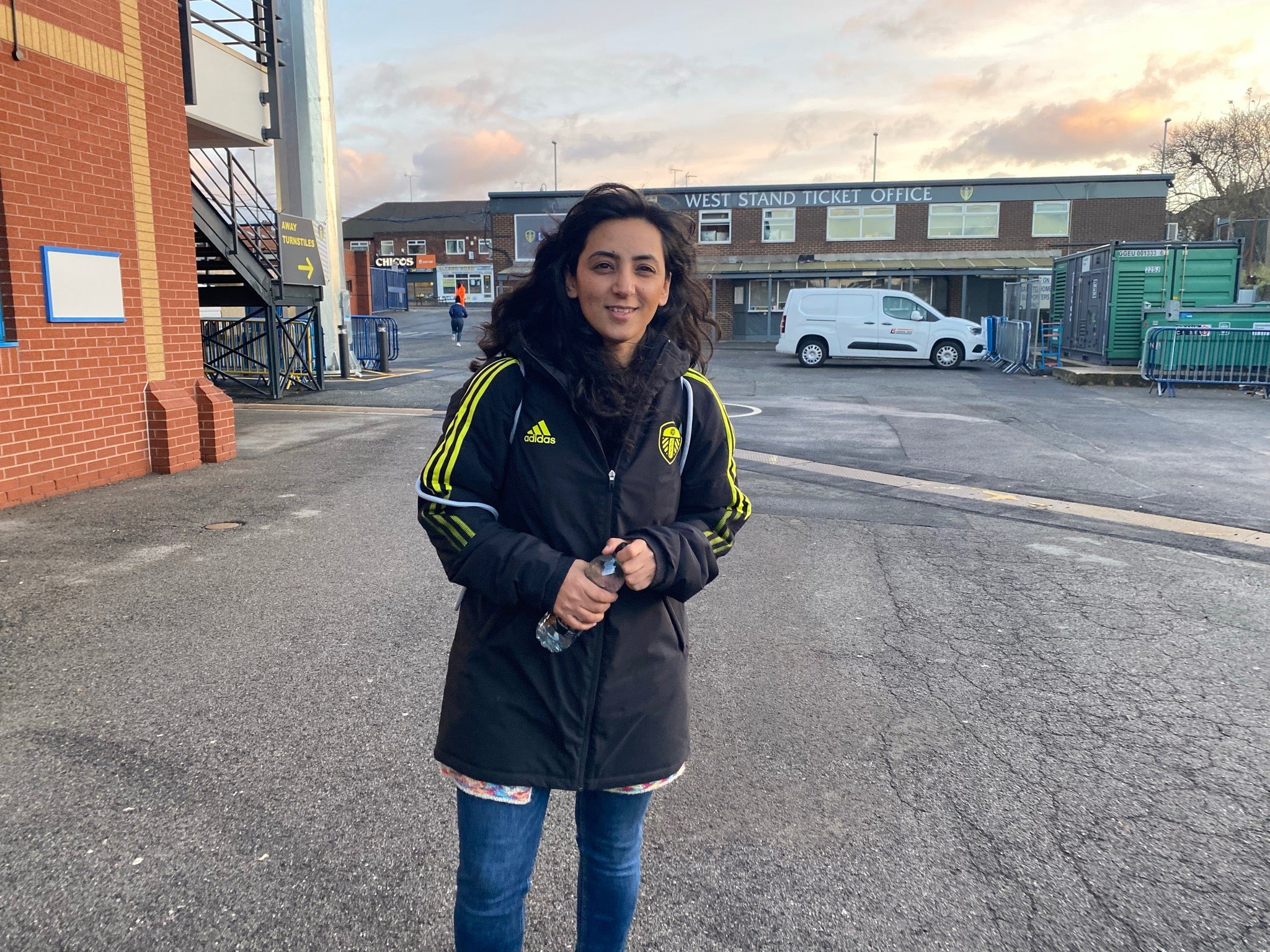‘You will be hanged’: Inside story of how girls from Afghan youth football team escaped Taliban
Exclusive: ‘Leaving the country was the only option’ says captain. ‘They have killed the soul of women and just left their bodies’
Women and girls beaten and threatened with death for playing football in Afghanistan have revealed the horror of their long and harrowing journey to safety in Britain.
Saberyah, a 24-year-old Chelsea fan and the captain of the Afghan national youth development team, and teammates endured months of torment after the Taliban seized control of their homeland, including beatings that left them “screaming.”
This newspaper revealed in early September how 32 players were left stranded and in danger after the British-backed government and armed forces fled. Now, in exclusive interviews with The Independent, some have recounted their ordeal and the “grave threats” to their lives.
Saberyah, who is now in a hotel in the UK alongside her team and some of their relatives, said: “When the Taliban came to Herat, I was at work. My husband came to get me.

“We were scared because the only people we saw in the streets were the Taliban. They were shooting. There was gunfire. Everyone was so scared.”
After the Taliban seized the whole country, she could no longer go to university or continue working, let alone playing football.
Saberyah said it quickly became very dangerous for the girls as they were widely recognised due to being footballers, so they began to plan their escape, gathering at first at a hostel in the capital, Kabul.
“When we arrived in Kabul, it was very scary because the Taliban were everywhere,” she recalled.
“They had checkpoints. They were beating people. They had guns, they had leashes. You could see violence on every street. We were hiding in a hostel, we locked down all the doors in the hope they would not find us.”
Saberyah said girls in the hostel whose parents were not there struggled financially but were supported by other team members.
They were living in “very bad” and “dangerous” conditions in the roughly 30 days they spent in Kabul, she added, explaining they could not leave the hostel unless their faces were covered and they were accompanied by a man.
Initial efforts to evacuate the girls to the Qatari capital, Doha, did not work as they were blocked from getting to Kabul airport because of the terror threat.
“It was a very bad situation,” Saberyah explained. “I sat in the street when we were kicked off the bus. Everyone was asking: ‘How can we get out?’. I had no answer. There was no hope.”
The girls were trapped there for another 10 days before gaining temporary visas to cross the border into Pakistan.
On their overland journey there, the girls were forced to wear very old clothes and burkas to cover their faces so nobody would recognise they were footballers.
It was while waiting at the border crossing into Pakistan that the girls say they were beaten by the Taliban for displaying their faces in the blistering heat of a jam-packed crowd.
“The Taliban were beating us with leashes on our hands and on our backs for not covering our faces,” said Saberyah, who started playing football on the street in her home province of Herat when she was 13.
“We were screaming. But we were in the middle of the crowd and the weather was so hot, we could not cover our mouths and noses.”
Saberyah said they again encountered the Taliban at a checkpoint on the border to cross into Pakistan – explaining they were forced to show a letter which immediately made it obvious they were footballers.

“The Taliban saw the letter in their hands and saw the logo of the Afghanistan Football Federation (AFF),” she added.
“They started saying: ‘Who are you? Are you football players? I had no choice than to say: ‘Yes, we are’. The Taliban started saying: ‘You are all non-Muslims. If you stay longer here you will be killed, our government will take you on the ground in front of everybody. You will be hanged’.”
Fortunately, as they were on the border, Pakistan border control said they had permission to come into the country. If this had not been the case, Saberyah fears the Taliban would have taken them away. The Taliban recently declared Afghan women would be blocked from taking part in all sports. The last time the hardline Islamist group ruled the country women were barred from working, girls were blocked from going to school, and women had to be chaperoned by a male relative if they so much as wanted to leave the house.
“100 meters from the football pitch, the Taliban attacked. There was bombing, explosions and ambulances and also the screams of people.”
But hostility from the Taliban predates their summer takeover, with Saberyah explaining the football team received so many death threats from them back in 2014 that they were forced to stop training for some time. They were receiving letters urging them to stop going to the stadium to play football, she says. But things are far worse now, she added.
“I was an active independent woman,” she said. “Everything was taken from me, leaving the country was the only option for me. They have killed the soul of women and just left their bodies.”
But Saberyah, who supports Chelsea, is hopeful about embarking on a new life here in the UK. However, their arrival in Britain has not been free of problems. Khalida Popal, the former Afghanistan women’s team captain who played a critical role in helping the girls escape the Taliban, said they had encountered racist protesters outside the hotel they are staying in.
“I have tried to protect them from the Taliban but I don’t know how to protect them from racism,” Ms Popal, who was forced to escape Afghanistan in 2011 as helping set up the national women’s football team had put her life in danger, said. “There are a lot of negative comments about their arrival. A lot of hate and racist comments.”
Ms Popal said all of the girls have lost their homes, with some having even lost family members. She said helping them leave Afghanistan was “traumatising” for her because it reminded her of her own childhood.

“It was scary,” she says. “It was difficult. It was traumatising. It was a lot of mental pressure. They have been through a lot of trauma. Some of their houses were bombed. They thought when they arrived in their new home, they would be welcomed. The first thing they faced was a protest against them. They are human beings, they deserve a second chance, they deserve kindness. They were forced to leave, they had no choice.”
But Ms Popal said she remains hopeful about the girls’ future. The team are being helped by the Leeds United chairman, Andrea Radrizzani, and Kashif Siddiqi, a London-born footballer who played for Pakistan’s international team. The girls have already started playing football and will soon start studying.
“The UK government gave us another chance to start our lives,” Susan, who is 23-years-old and also plays for the Afghan football team, said. “My mum, dad and sister are still in Afghanistan. I see them in my dreams and I cannot save them. I wake up and I call them feeling desperate.”
Sonia, a fellow football player, explains her mother, father and sister are still back in Afghanistan, as well as some teammates and friends. “They are contacting us telling us to save their lives,” the 20-year-old added. “We don’t know how to help.”
Casting her mind back to their last ever football practice in Afghanistan, Sahar, her teammate, recalls the terror at learning their lives were about to change beyond recognition. “100 meters from the football pitch, the Taliban attacked,” the 18-year-old says. “There was bombing, explosions and ambulances and also the screams of people. The coach stopped the training and said the Taliban has taken over.”
The coach then suggested they take one last team photo but Sahar said the girls struggled to come to terms with news of the Taliban’s takeover. “We said, it is not possible our country has collapsed that easily, we are not giving up. We had our bags packed ready to go to Tajikistan to play in the Central Asian World Cup.”
Like Susan, Fatima, a 20-year-old midfielder, is also plagued with nightmares about her home country. “Every night a Taliban man with a long beard, a turban and a gun is following me,” Fatima recollected. “I see my city Herat full of blood. For 15 days and nights in a row, my village in Herat was without electricity. There was continuous fighting, there was continuous gunfire, bombing, and helicopters. Half of the house where I was living went down.”
She said her entire family of nine were in the basement hiding for nine days straight – adding that the youngest was just three years old. She said only her father was leaving the house to buy supplies during this time.
“We could not go close to the window,” she says. “The day the Taliban took over they were celebrating their victory, guns were firing everywhere. So many people were killed because of their celebration. They were constantly firing.”
Join our commenting forum
Join thought-provoking conversations, follow other Independent readers and see their replies
Comments





Bookmark popover
Removed from bookmarks